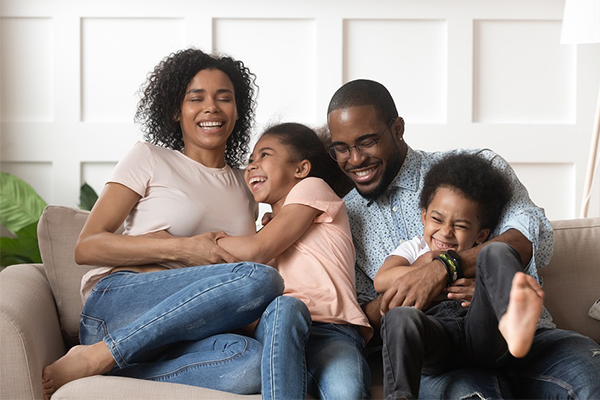Public places are opening up again, dates are being set for summer camps or graduation, and many of us have finally been able to get good haircuts.
So…why do we still feel so unsettled?
Life may sort of be getting back to something that’s a little more normal, but we’re not quite there yet. We’re still working while trying to teach or distract our kids; doing laundry or dishes late into the night to catch up; and still missing all the normal things we used to do this time of year, like visits to the farmer’s market, dinners with friends, and planning vacations.
If you and your child are still feeling anxious—even though life is opening back up—give yourself a break, say experts.
It’s called self-compassion—and “it means being kind to yourself,” said Dr. Amy House, a psychologist with Augusta University Health. “The root of the term compassion means ‘suffering with,’ so self-compassion is to be with yourself in your suffering.”
Many of us have had real losses during this time, including the death of loved ones or losing a job or income. Others have struggled with huge changes related to social distancing, such as missing out on milestones like graduation or birthdays. Either way, there’s a grieving process, says House. “Life as we thought it was going to happen is not happening,” she said. “The losses associated with that as well as the fear and anxiety about what might happen or could happen opens up the opportunity for self-compassion.”
Here’s What Self-Compassion Looks Like
Say it’s been a crazy Monday: You had an important call, your youngest had a huge tantrum because you’re out of strawberry pop tarts, and in the midst of all this, you’re juggling getting your older kids set up for their school assignments and making sure the Crock-Pot is on for dinner.
At lunch, you realize that your oldest child missed a Zoom call for his math class. Your first instinct? You think, “It’s all my fault; I just can’t do this—I’m a total failure.”
Self-compassion flips the script: Even if that’s your first thought, your second can be: “It’s OK; this is hard, and it would be hard for anyone. I’m doing the best I can, and tomorrow, I’ll try again.”
“It’s never too late to shift to self-compassion after you notice the self-judgmental response,” said House.
According to the book, Self-Compassion, by educational psychologist Dr. Kristin Neff, three key steps to making self-compassion work are:
- Recognize the need. “Recognize that you’re hurting or stressed or that this is a moment of suffering,” said House.
- Recognize your common humanity. “You’re not alone in experiencing life as difficult sometimes,” she said. “You’re not doing it wrong; these are hard moments that would be hard for anyone.”
- Offer yourself some kindness. “Say words to yourself and conceptualize them as a wish for your own peace and wellbeing or as a prayer for peace and wellbeing,” she said. “Use whatever words seem soothing and kind to you, and you can even pair that with kind self-touch by putting your hand on your heart or giving yourself a little hug.”
Certain activities can also be self-soothing. The best are those that soothe your five senses: sight, smell, sound, taste and touch. For example:
- Sitting in a comfortable shady spot in your backyard, with a view of the trees, listening to birdsong while sipping tea or coffee
- Enjoying a warm bath with candlelight, your favorite music, and an ice-cold beverage or a sweet snack
- Finding a quiet space with a favorite book and a treat and taking some slow deep breaths
- Biking or hiking a favorite path next to running water
While the research is relatively new on this topic, it does tell us that the practice of self-compassion is associated with better overall well-being, and helps people be more resilient and less vulnerable to depression. Intuitively, it also likely helps people recover better from failure.
Self-Compassion and Kids
Like most things, the best way for parents to teach self-compassion to kids is by modeling it themselves. “When you as a parent make a mistake, say something out loud that’s compassionate to yourself and let yourself off the hook so that your kids can hear you doing that,” said House.
For example, last winter, House was on vacation at Universal Studios with her family when, during dinner, she suddenly realized she’d left her wallet in the park. She and her oldest son raced back to try to find it. “As we were on the way, I said, ‘I can’t believe I’m such an idiot,’” said House. “And as soon as I said it, I thought, ‘I don’t want to him to hear me say that.’
So, she course-corrected. Fortunately, a security guard had found the wallet and was able to get it to her right away. As they walked out of the park, she made a point of saying, “On the way here, I realized I was being too hard on myself. I’m sorry I said that; it was just a mistake, and everyone makes mistakes.”
Her son said, “It’s OK, mom.” Said House, “It was just important to me to do that out loud with him and model that for him.”
Finally, know too that when your kids make a mistake, the way you respond to that teaches them how to respond to their own mistakes. “If you respond to them with compassion and understanding, then they will also learn to respond to themselves in that way,” said House.
“Most of us try to teach our kids to be kind to others, but perhaps we can all do a better job at being kinder to ourselves.”




